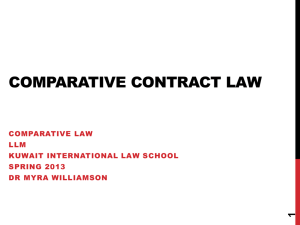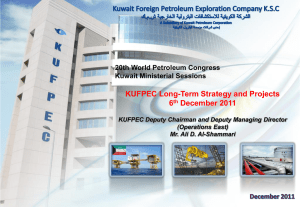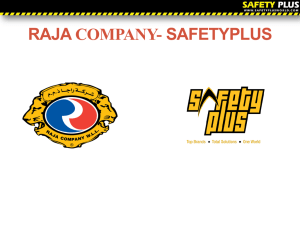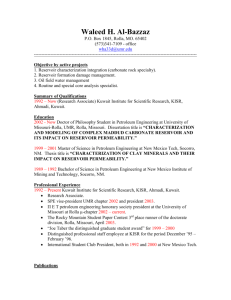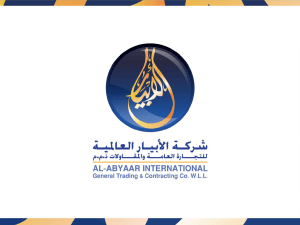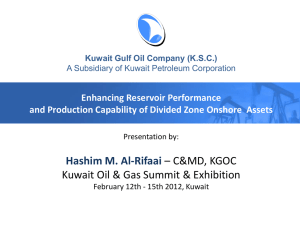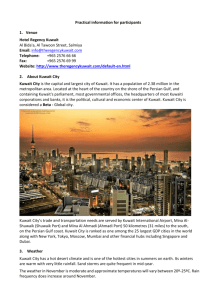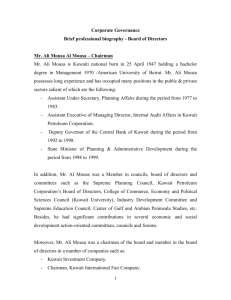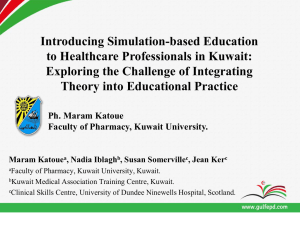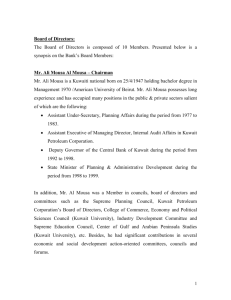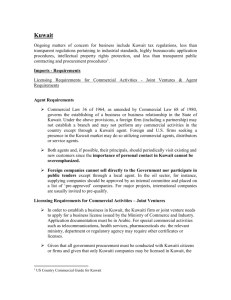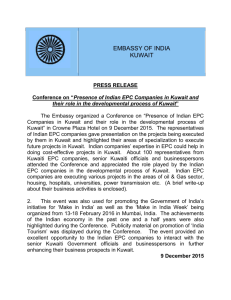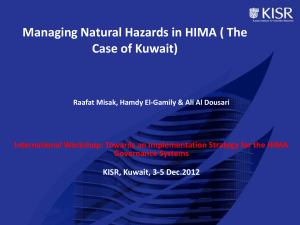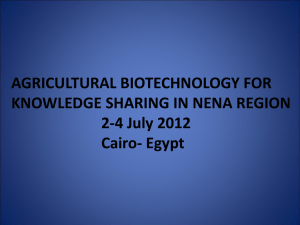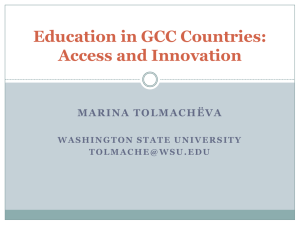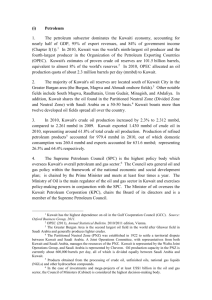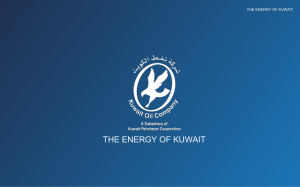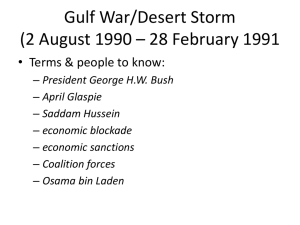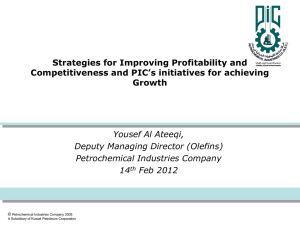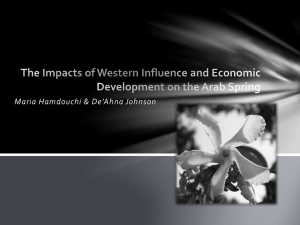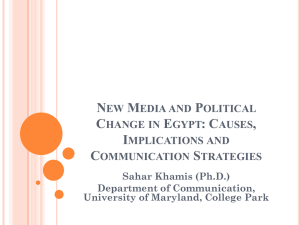File - Arkansas` Global Connections
advertisement
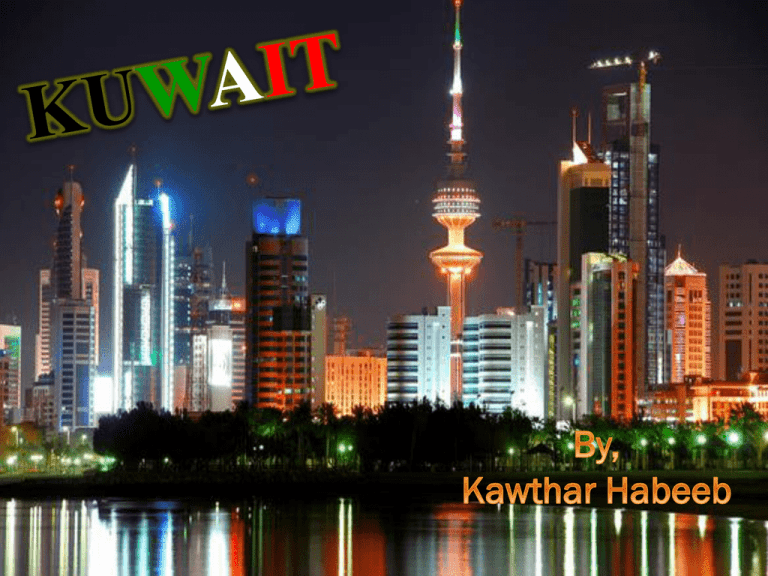
Population : • 3,632,009 • including approximately 1.16 million Kuwaiti citizens, • 2.47 million non-Kuwaiti nationals, and • 100,000 stateless persons. • Approximately 68% of the total population is non-Kuwaiti Annual population growth rate (2011 est.): 2% Ethnic groups: Kuwaiti 32%, other Arab 27%, South Asian 37%, other 4%. Religion: Muslim estimated 85% (Sunni 70%, Shi'a 30% among Kuwaitis), with sizable Hindu, Christian, and Buddhist communities. Languages: Arabic (official). Education: free at all levels for Kuwaitis, including higher education. Adult literacy 93.3% for the total population (age 15 and over, 2009; male 94.4%, female 91%). Work force (2009 est.): 2.091 million (75% male, 25% female; 20% Kuwaiti citizens). Kuwait has a sizable foreign labor force (approximately 68% of the total population is non-Kuwaiti). Government Type: constitutional, hereditary emirate ruled by princes (Amirs) who have been drawn from the Al Sabah family since the middle of the 18th century. Independence: June 19, 1961 (from the United Kingdom). Administrative subdivisions: Six. governorates Political parties: None; formal political parties have no legal status, although de facto political blocs exist. Elections: There are no executive branch elections; the Amir is hereditary; prime minister and crown prince are appointed by the Amir. Economy Kuwait is a geographically small but wealthy country with a relatively open economy and self- reported crude oil reserves of nearly 105 billion barrels--approximately 8% of world reserves. Petroleum accounts for nearly half of GDP, 95% of export revenues, and 95% of government income. GDP - per capita (PPP): $40,700 (2011 est.) . Real GDP growth rate (2010 est.): 4.4%. Natural resources: Oil, natural gas, fish, shrimp Agriculture and fishing (about 8.02% of GDP): With the exception of fish, most food is imported. Cultivated land--1%. Industry: Types--oil and gas (about 43.35% of GDP) including petroleum extraction and refining, fertilizer, chemicals, desalination, construction materials. Manufacturing: About 5.14% of GDP. Services (about 30% of GDP): Types--public administration, real estate, trade, hotels, and restaurants. Financial institutions: About 13.49% of GDP. Shipping : The Kuwait Oil Tanker Company has 24 crude oil, liquefied petroleum gas, and refined product carriers and is the largest tanker company in an OPEC country. Kuwait is a member of the United Arab Shipping Company. Trade (2010 est.): Exports : $65.98 billion f.o.b.: oil (93%). Major markets--Japan 17%, South Korea 18.8%, India 15.1%, U.S. 7.6%, Singapore 8.1%, China 12.9%, Taiwan 11.9%. Imports : $19.4 billion f.o.b.: food, construction materials, vehicles and parts, clothing. Major suppliers : U.S. 10.8%, Japan 7.2%, Germany 7.6%, China 12%, Saudi Arabia 5.9%, Italy 4.4%, U.K. 3.2%, India 5.4%, U.A.E. 4.2%, South Korea 4.2% (2009). Industry and Development Industry in Kuwait consists of several large export-oriented petrochemical units, oil refineries, and a range of small manufacturers. It also includes large water desalinization, ammonia, desulphurization, fertilizer, brick, block, and cement plants. The U.S. and Kuwaiti governments signed a Trade and Investment Framework (TIFA) agreement in 2004, providing a forum to address mutual trade concerns and needed economic reforms. Kuwait and the other GCC nations signed a free trade agreement with Singapore in 2008, and with the European Free Trade Association (EFTA) in 2009. Kuwait does not attract significant foreign direct investment (FDI), largely due to bureaucratic obstacles and barriers to doing business in Kuwait. Kuwait is a member of the UN and some of its specialized and related agencies, including the World Bank (IBRD), International Monetary Fund (IMF), World Trade Organization (WTO), African Development Bank (AFDB), Arab Fund for Economic and Social Development (AFESD), Arab League, Arab Monetary Fund (AMF), Council of Arab Economic Unity (CAEU), Economic and Social Commission for Western Asia (ESCWA), Group of 77 (G-77), Gulf Cooperation Council (GCC), INMARSAT, International Development Association (IDA), International Finance Corporation, International Fund for Agricultural Development, International Labor Organization (ILO), International Maritime Organization, Interpol, International Olympic Committee, Islamic Development Bank (IDB), International Federation of Red Cross and Red Crescent Societies, Non-Aligned Movement, Organization of Arab Petroleum Exporting Countries (OAPEC), Organization of Islamic Cooperation (OIC), Organization of Petroleum Exporting Countries (OPEC), and the International Atomic Energy Agency (IAEA). Social Benefits The government has sponsored many social welfare, public works, and development plans financed with oil and investment revenues. Among the benefits for Kuwaiti citizens are retirement income, marriage bonuses, housing loans, virtually guaranteed employment, free medical services, and education at all levels. By Amiri decree, the government occasionally disburses a portion of its budget surplus as a grant to all Kuwaiti citizens. Foreign nationals residing in Kuwait do not have access to these welfare services. The right to own stock in publicly traded companies, real estate, and banks or a majority interest in a business is limited to Kuwaiti citizens and citizens of Gulf Cooperation Council (GCC) countries under limited circumstances. Education There are two main ministries involved in the development of the education sector: the Ministry of Education and the Ministry of Higher of Education. The general education system consists of four levels: • kindergarten(lasting for 2 years), • primary (lasting for 5 years), • middle school (lasting for 4 years) and • high school (lasting for 3 years.) All the levels including higher education are free. There are 3 state-funded higher education institutions in Kuwait, namely • Kuwait University, • the College of Basic Education, and • the Higher Institutes for Theater and the Music Arts. http://www.ifitweremyhome.com/compare/US/KW Deshdasha Besht Ghutra Abaaia - Malfaa Kuwait Aquarium Parliament building Kuwait Towers Kuwait Towers Reserve water tanks Restaurant Restaurant Traditional Kuwait Markets The Avenues center, the largest shopping mall in Kuwait Al-Mohalab Mall Kuwait marina beach Kuwait Aqua Park Artificial island Kuwait entertainment city Kuwait Ice Skating Rink Sharq marina Kuwait City kuwait Sharq Mall Kuwait city Presentation created by Kawthar Habeeb
